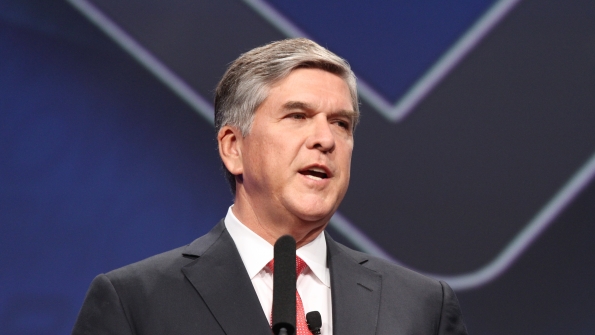WASHINGTON—Speaking today during The Media Institute’s Communications Forum luncheon, NAB President and CEO Gordon Smith took aim at AT&T and DISH, suggesting they and other pay-TV providers may be “purposefully withholding” local TV signals from customers to create a crisis and goad Congress into reforming retrans consent.

“Is their goal to manufacture the appearance of a ‘broken system’ to encourage Congress to intervene just as it deliberates the upcoming STELAR [Satellite Television Extension and Localism Act Reauthorization] expiration? If so, that is a dangerous game, and one that hurts viewers—their customers—the most,” said Smith.
Smith framed his argument in the context of the importance of local TV news to democracy, particularly in a time when social media is transforming political discourse. While the number of social media users continues to grow, it is becoming harder for them to sort fact from fiction on platforms like Facebook and Twitter, he said.
“Though the rise of social media can be seen as democratizing, giving a greater number of people the opportunity to express their thoughts and opinions in an open forum, I believe it has also been a destabilizing force that has impacted our society in troubling ways. The paradox of social media—democratizing, yet destabilizing,” said Smith.
The antidote is the coherence local broadcasters give their communities, he explained, pointing to surveys that find local residents trust their stations to provide accurate news without bias.
“Local stations’ investigations protect consumers from scams, and their reporting of local elections help voters make informed decisions,” he said. Smith also gave a hat tip to broadcast network news shows, such as “60 Minutes,” “Meet the Press” and “This Week” as well as presidential debates that inform citizens and keep officeholders accountable.
“It’s unfortunate that at a time when this trusted information is so critical to our communities, some of our pay-TV partners, like AT&T and Dish, seem to be purposefully withholding broadcast signals from viewers—making them pawns in a political game that aims to upend the retransmission consent system,” he said.
The professional video industry's #1 source for news, trends and product and tech information. Sign up below.
Without the compensation broadcasters receive for retrans from AT&T, DISH and others, it would be impossible for stations to pay for “investigative journalism and expensive sports coverage and invest in sophisticated weather operations that save lives and provide in-depth local news coverage,” he said.
Turning to Next-Gen TV, Smith said ATSC 3.0 will converge over-the-air and over-the-top to enhance the viewing experience. Developing Next-Gen TV and other platforms will give broadcasters more outlets “to deliver the stories our communities rely on every day for free,” he said.
To enable new platforms to thrive, broadcasters need the ability to develop new products and services quickly without “unnecessary regulations,” Smith said.
“Lawmakers can enable broadcasters to better compete and to support journalism in this challenging landscape by modernizing outdated broadcast regulations that prevent us from competing on a level playing field with these behemoth tech and pay-TV companies,” said Smith.
While the technology of broadcasting will change over the years, one thing will remain the same: “Our communities will always turn to their local TV and radio stations to follow the inspiring events that have shaped our nation,” said Smith.
“They will always count on us to be their eyes and ears … to guide them to safety during times of crisis … to share life’s greatest moments … and to connect to families, friends and neighbors.
“They will always count on us to be the megaphones for freedom and democracy,” said Smith.
Phil Kurz is a contributing editor to TV Tech. He has written about TV and video technology for more than 30 years and served as editor of three leading industry magazines. He earned a Bachelor of Journalism and a Master’s Degree in Journalism from the University of Missouri-Columbia School of Journalism.

